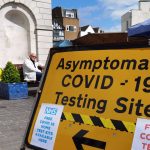Pregnant women who are suspected to have pre-eclampsia will be offered a test on the NHS to detect the condition.
Pre-eclampsia affects some pregnant women, often during the second half of pregnancy or after they have given birth.
It can lead to serious complications if left undetected, with early signs including high blood pressure and protein in the urine and in some cases, women can develop severe headaches, vision problems, pain below the ribs, swelling and vomiting.
Tests have previously been available to rule the condition out but they will now be available to detect a positive diagnosis.
The National Institute for Health and Care Excellence (Nice) said midwives can use one of four blood tests to help diagnose suspected preterm pre-eclampsia and they can be used from 20 weeks to 36 weeks and six days.
Experts hope they will pick up the 6% of pregnancies affected by the condition.
The tests measure the levels of placental growth factor (PLGF), which is a protein that helps develop new blood vessels in the placenta.
‘Long-term decline’ in critical cancer care as ‘exhausted’ NHS workers battle staff shortages
NHS: Video appointments with GPs offer ‘minimal’ benefits, study suggests
Government to set out NHS reforms for patients to benefit from improved and personalised care
Levels of PLGF in the blood can be abnormally low and could be a sign that the placenta is not developing.
Jeanette Kusel, acting director for MedTech and digital at Nice, said: “New evidence presented to the committee shows that these tests can help successfully diagnose pre-eclampsia, alongside clinical information for decision-making, rather than just rule it out.
“This is extremely valuable to doctors and expectant mothers as now they can have increased confidence in their treatment plans and preparing for a safe birth.”
Dr Mark Kroese, chair of the Nice diagnostics advisory committee, said: “The committee called for further research when it looked at this topic in 2016. Following some excellent research, we can now issue draft guidance for four tests which the NHS can use to help diagnose pre-eclampsia.”






















